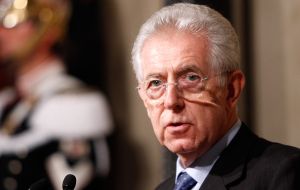MercoPress. South Atlantic News Agency
Positive market reactions as Monti begins task of forming new government in Italy
 Italy must be an element of strength not weakness, said Monti in his first speech
Italy must be an element of strength not weakness, said Monti in his first speech Mario Monti is starting work to form a new government to lead Italy out of its acute debt crisis which prompted the resignation of Silvio Berlusconi. The appointment of Mr Monti, an ex-EU commissioner, was announced by Italy's president on Sunday.
Mr Monti said he wanted to build “a future of dignity and hope” for Italy's children. The first test of his appointment will come with the opening of European financial markets on Monday.
Asian stocks have already risen in early trading. Hong Kong's Hang Seng index was up more than 2.2%.
Monti, a 68-year-old economics professor, refused to set a timetable for the formation of a new government, and would not say who he planned to nominate as ministers. But he said consultations would start on Monday. The formal confirmation of the new technocratic government could take several days.
Italy's borrowing costs have spiked, threatening the Euro zone. Hailing Mr Monti's appointment, EU leaders vowed to monitor Italy's austerity measures.
President Giorgio Napolitano held 17 meetings with senior politicians before nominating Mr Monti as Prime Minister. Most parties, including Mr Berlusconi's, approved his nomination.
Speaking to reporters shortly afterwards, Mr Monti said: “Italy must again be and must increasingly be an element of strength, not weakness, in a European Union that we helped found and in which we should be protagonists.”
“We will aim at solving the financial situation and resume the path of growth, while remaining attentive to social equity”.
Mr Monti promised he would act “with urgency” and said he would work with parliament “to get out quickly from a situation which has elements of an emergency but which Italy can overcome with a united effort”.
Mr Napolitano said the nomination was not about overturning the result of the elections of 2008 - but Italy needed a government that “could unite the diverse political forces in an extraordinary effort warranted by the current financial and economic emergency”.
Asked about the lifespan of a Monti government, Mr Napolitano said this depended on “the actions of the government, the reaction of the economy, of the markets, investors, of the European and international institutions”.
Speaking in a recorded TV address, Mr Berlusconi said he would support a technocrat government and redouble his own efforts in parliament to modernise Italy.
Most centrists and centre-left parties in the opposition have already pledged their support.
However, Mr Berlusconi's main coalition ally, the Northern League, has withheld its support until Mr Monti's policies have become clear.
Mr Berlusconi, who had lost his parliamentary majority, resigned on Saturday after new austerity measures were passed by both houses of parliament.
In Brussels, European Commission chief Jose Manuel Barroso and EU President Herman Van Rompuy issued a joint statement welcoming Mr Monti's appointment.
It sent “a further encouraging signal... of the Italian authorities' determination to overcome the current crisis”, they said.
The Commission, they added, would continue monitoring “the implementation of measures taken by Italy with the aim of pursuing policies that foster growth and employment”.
Mr Monti's appointment comes two days after Greece, under even greater pressure from Brussels, inaugurated a technocrat government to cope with its debt problems.
But there is significant opposition to him within the country, and a feeling that Italy's troubles are just too deep for a mere change of government to make any rapid, significant difference.
The austerity package anticipates 59.8 billion Euros in savings from a mixture of spending cuts and tax rises, with the aim of balancing the budget by 2014. Measures include sales of state property, a freeze on public-sector salaries until 2014 and measures to fight widespread tax evasion.
The Italian economy has grown at an average of 0.75% a year over the past 15 years.




Top Comments
Disclaimer & comment rulesCommenting for this story is now closed.
If you have a Facebook account, become a fan and comment on our Facebook Page!